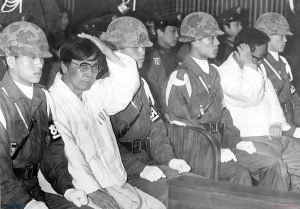October 26th marks the anniversary of the assassination of South Korean dictator Park Chung-hee. Park was shot in the head and chest in 1979 by Kim Jae-gyu, who held dual posts as Park’s security chief and director of the Korean Central Intelligence Agency (KCIA). Despite occurring many decades ago, this event offers some interesting context for understanding the motives that could lead a regime insider to turn assassin – and whether such a violent end could befall Russian President Vladimir Putin.
Even now, Kim’s motivations remain controversial. Most of what is known about him is based on documentaries and personal accounts published after the year 2000, when South Korea finally entered a fully democratized phase in its political history. Despite the murk, certain details appear to have stood the test of scholarly scrutiny, revealing Kim’s character to be both complex and conflicted.
Kim’s initial rise into Park’s dictatorship was through appointment as an infantry commander. In 1964, when demonstrations broke out against Park’s handling of the treaty that normalized relations between Japan and South Korea, Kim was dispatched to quell them. This responsiveness and the fact that Kim and Park were both born in the town of Gumi likely helped cement their relationship, resulting in a series of promotions for Kim over the next decade that culminated in his appointment as KCIA director in 1976.
Despite the upward mobility, Kim seems to have harbored concerns about Park’s expanding dictatorial powers. He, for example, opposed the formation of the Hanahoe, an unofficial cadre of military officers who swore direct allegiance to Park rather than the Korean constitution. (It was, incidentally, the leader of this cadre, Chun doo-hwan, who seized power in a coup shortly after Park’s death.)
When Park ran for a third term in the 1971 presidential election, Kim is alleged to have persuaded him to promise voters it would be his last. When Park reneged on this promise and installed the Yushin Constitution, granting himself sweeping executive and legislative powers, Kim reportedly was in opposition.
Kim’s conflicting allegiances between Park and the floundering Korean democracy could be glimpsed in various accounts of his relationship with Jang Jun-ha, a pro-democracy journalist. At one point, Jang and Kim appear to have conspired to assassinate Park in 1973, a plan Kim failed to carry out. When Jang died under mysterious circumstances while climbing a mountain in 1975, Kim is alleged to have provided support to his family by anonymously buying paintings at unrealistically high prices.
Kim’s loyalties to Park appear to have come under great duress with the introduction of Cha Ji-chul, who was appointed as Park’s chief bodyguard in 1974, following the assassination of Park’s wife Yuk Young-soo. Many eyewitnesses attest Cha was a constant thorn in Kim’s side, belittling him publicly and repeatedly meddling in KCIA business, with an eye on Kim’s job.
Things came to a head in the summer of 1979, when Kim Young-sam, leader of the opposition New Democratic Party (and later president), publicly called on the United States to withdraw support for the Park regime. Park responded by pressuring the courts to expel Kim from the National Assembly, prompting the Carter administration to withdraw its ambassador in protest. On October 16, pro-democracy demonstrations broke out in Kim Young-sam’s hometown of Busan, resulting in arson attacks on police stations. Demonstrations soon spread to Masan and other cities, reaching the size of a popular uprising.
In testimony given at his trial following Park’s death, Kim Jae-gyu claimed his decision to kill Park was greatly motivated by Cha’s insistence on a violent crackdown on the demonstrations, a proposal Park allegedly endorsed over Kim’s repeated objections. This, Kim claimed, was also his justification for killing Cha, whom he shot dead the same night as Park. Despite insisting he had saved Korean democracy, Kim and his co-conspirators were eventually executed.
Although we cannot know for sure the degree to which democratic ideals, jealousy, policy disputes, fear, self-interest, and revenge played into Kim’s actions, these variables seem certain to be playing out in the minds of many Russian officials currently in Putin’s inner circle. Like Kim, many must see their leader as an existential threat to their country. Many are sure to disagree with his policies, having tried to steer him in a different direction without success. Some must also have suffered the indignity of lost favor, harboring feelings of resentment as a result. As conditions in Russia continue to worsen through diplomatic isolation, economic deprivation, and domestic unrest, one can only expect the likelihood of an assassination attempt to increase.

































